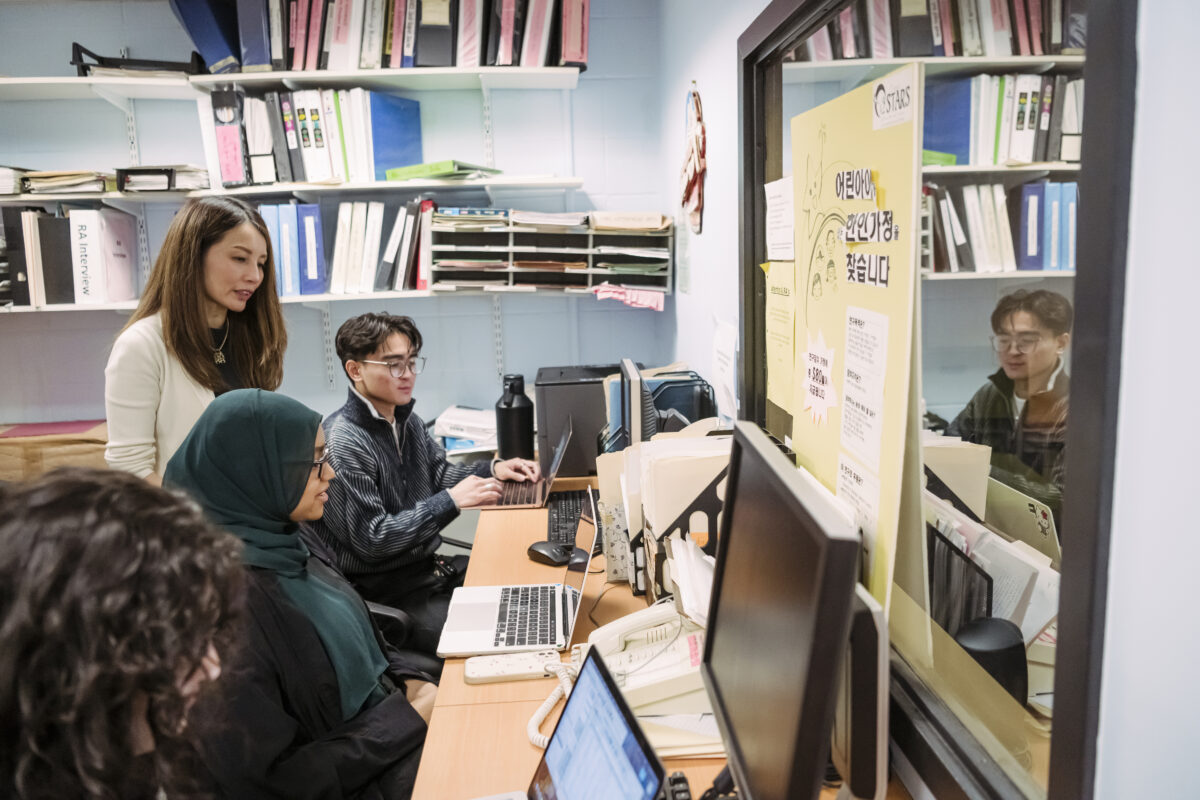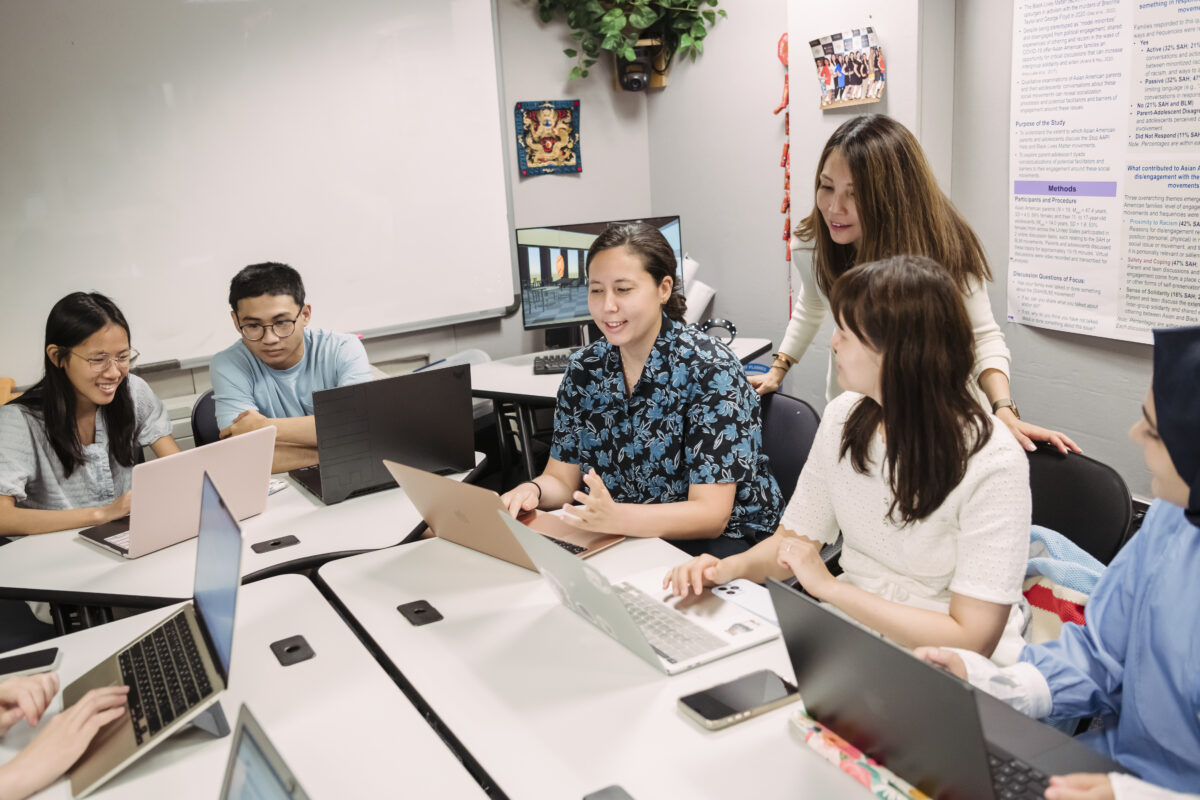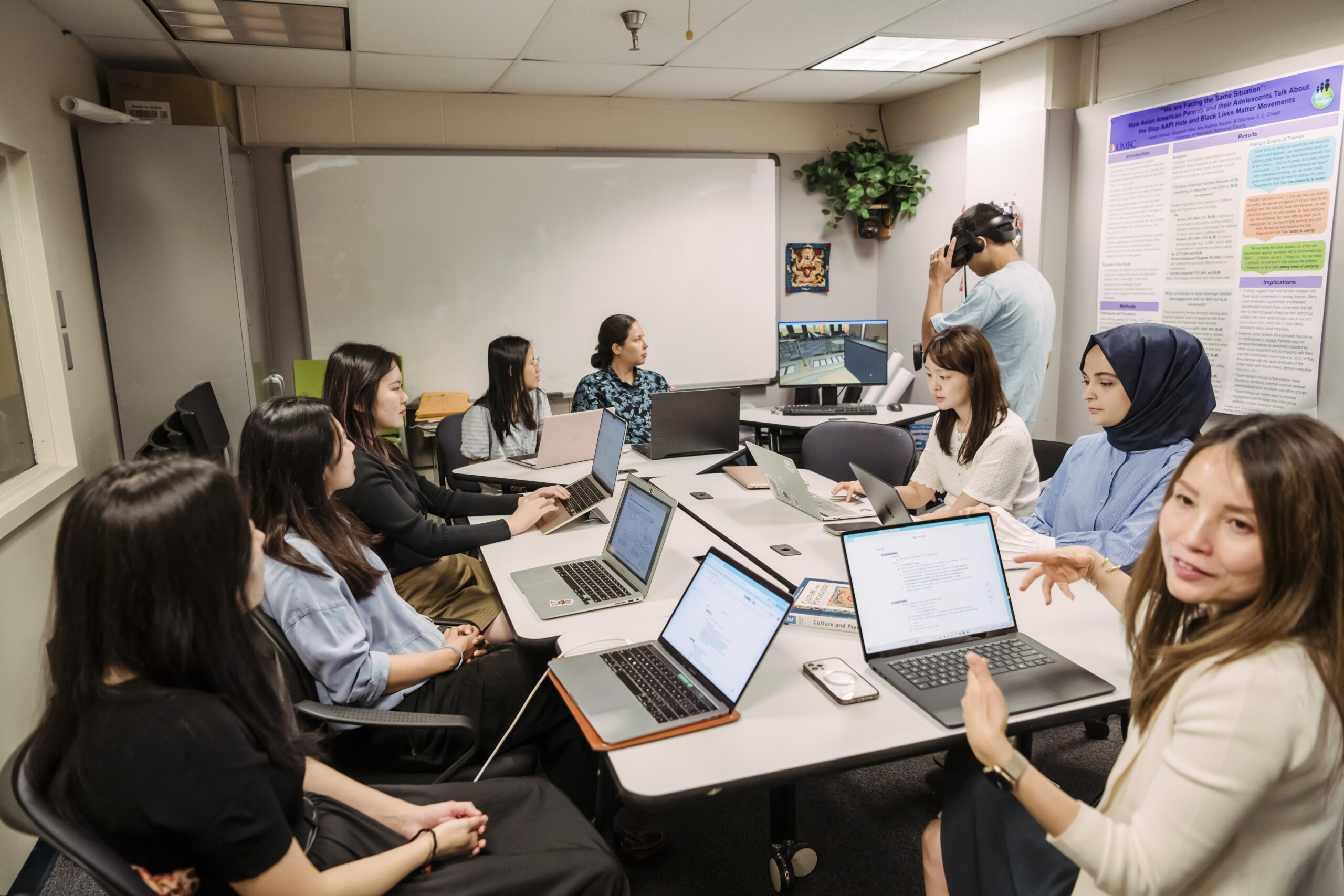Graduate students rely on internet research and word of mouth to hear about programs that align with their interests. For Hatice Gürsoy, word of mouth led her from the Republic of Türkiye to UMBC’s Culture, Child, and Adolescent Development Lab, when she was looking for developmental psychology doctoral programs that could support her interests in the resiliency of Muslim immigrants. “One of Dr. Charissa Cheah’s doctoral students also happened to be from Türkiye. She connected me with Dr. Cheah, and we bonded from that moment over my research interests,” says Gürsoy.
Gürsoy is not alone in her trajectory to Cheah’s lab. Students worldwide are drawn to lab founder and director Charissa Cheah’s hands-on approach to teaching, mentoring, and research. “I tell students that my lab is a vibrant space where they can build expertise in collaborative public impact research,” says Cheah, a professor of psychology. She studies adolescent social-emotional development and the well-being of families from minoritized backgrounds, emphasizing the experiences of those from Asian, Middle-Eastern, and North African heritage, which are frequently overlooked in psychology research, she says.
To approach this seemingly broad array of topics, Cheah offers graduate students seven ongoing research projects to choose from, including the latest project—Asian Americans’ Resilience, Identity, and Socialization of Engagement (ARISE), which focuses on the impact of racism and discrimination on Chinese, Korean, and Filipino American families parents’ and adolescents’ relationships, multiple identities, racial-ethnic socialization, civic engagement, and development.
Earlier in 2024, Cheah was invited to the White House to present the latest findings on the ARISE project with the Office of Science and Technology Policy. “It is empowering to represent the voices of marginalized groups, especially early career scholars, and to speak with individuals who aim to use this information to shape policies that decrease bias and hate,” she shared there.
Mentoring through unprecedented changes
Thanks to Cheah’s approach to mentorship, Hyun Su Cho, Ph.D. ’24, applied developmental psychology, had the support she needed to navigate unprecedented changes like COVID-19, in-person and virtual classes, and welcoming a new child. “It can all be very overwhelming,” says Cho. “Charissa is very busy, but she always finds time for you.”
Cho found her way to Cheah’s lab after reading her research while completing her master’s in developmental psychology at Seoul National University in South Korea. “I had the same master’s advisor as a former doctoral student in the lab and she introduced me to Dr. Cheah during a conference,” says Cho. “I was interested in parenting and world culture. Her lab offered opportunities to study multiple Asian communities.”

Initially, Cho collaborated with Korean American families on the Immigrant Children’s Successful Transition and Adaptation Research project. Later, she became deeply involved in the ARISE project. This work led to several publications and funding awards to complete her dissertation.
Huiguang Ren, Ph.D. ’24, applied developmental psychology, also found his way to Cheah’s lab through a recommendation. As a master’s student in developmental psychology at East China Normal University, “I wasn’t sure whether to go straight into industry or continue with a Ph.D.,” says Ren. He sought guidance from his mentor, who was researching adolescent development in Shanghai with Cheah. Ren started at UMBC as a visiting scholar before joining the doctoral program. “After working with Dr. Cheah, I decided research is something that intrigues me, and it’s a career that I want to pursue. ”
Passing on the skillset
Ren also worked on several projects in addition to ARISE. He helped set up the Strengthening Asian American Families’ Excellence and Resilience project, one of the first National Science Foundation grants to explore the influences of the COVID-19 outbreak on racial discrimination, identity development, and socialization. Ren and Cho managed classes, guided students through research methods, helped them develop scientific language, and showed them how to analyze the data they collected and disseminate it to families and scholars. He now has a faculty position at his alma mater but initially struggled with imposter syndrome about guiding undergraduates. “And then I realized I have mentored quite a few students during my time in Dr. Cheah’s lab,” Ren says. “And then I realized I have mentored quite a few students during my time in Dr. Cheah’s lab,” Ren says.

Gursoy is now in the fifth year of her doctoral program focused on the Identities of Muslim American Adolescents and their Growth and Excellence research study. This project explores the impact of identity, interpersonal relationships, racism, and cultural socialization factors on Muslim American development and adjustment.
Like Cho and Ren, Gürsoy mentors undergraduates, modeling Cheah’s methods and plans on taking those skills with her. “Working with undergraduates is one of the things I love doing best. They are creative, curious, and are not afraid to tell you something that might not work,” says Gürsoy. “Dr. Cheah has been holding my hand throughout my journey. Helping me learn by giving me constructive feedback. I want to give the same kindness to our undergraduates.”
Learn more about UMBC’s psychology department.
Tags: CAHSS, Fall 2024, International, Psychology, Research

